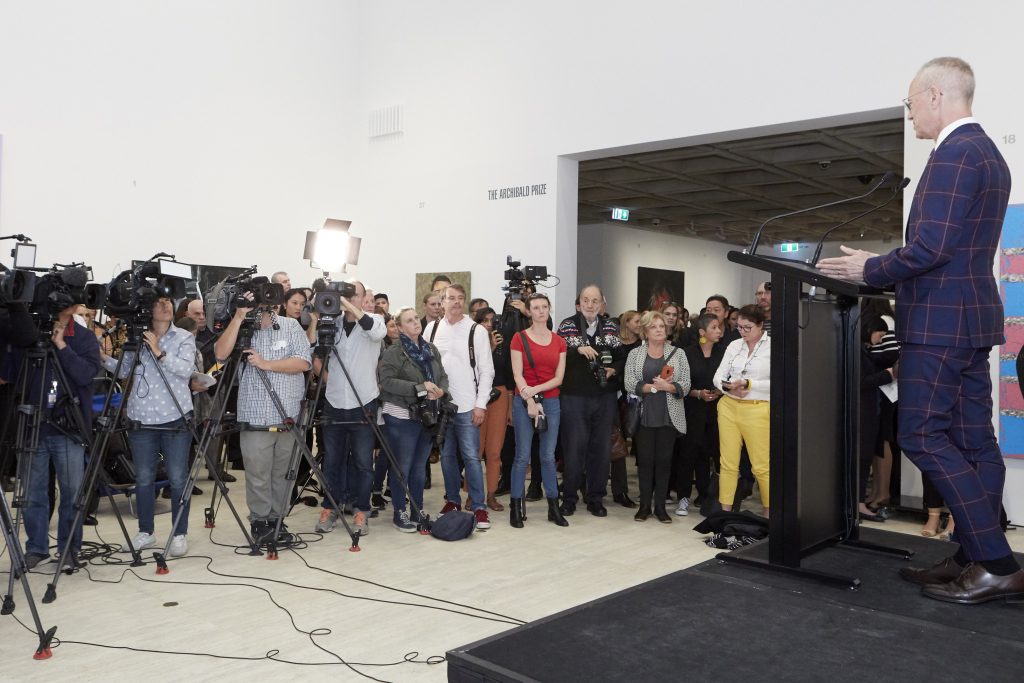Archibald Prize 2020

About
Arts Law regularly reviews the terms and conditions of competitions and rates them out of five stars. Our review looks broadly at the terms and conditions of a competition. In particular, we look closely at how a competition deals with an entrant’s copyright and moral rights, and consider this in light of the prize. Entrants should always take into account the possible profile-raising which may result from being a finalist or winner.
By accepting the terms and conditions of a competition, entrants should be aware that they may be entering a legally binding contract.
For more information, see our free information sheet on competition conditions. Artists are welcome to contact Arts Law for legal advice on the terms of a competition. We also invite competition organisers to contact Arts Law for best practice assistance to make their terms and conditions fairer for artists.
Please note: Prior to February 2018, Arts Law rated out of five stars only the terms of a competition which dealt with copyright and moral rights (using our previous rating systems https://www.artslaw.com.au/advocacy/prizes-and-competitions). Arts Law’s competition reviews are now more holistic, such that our rating out of five stars now reflects a broad review of all the terms and conditions of the competition.
Review
This month Arts Law has reviewed the terms and conditions of the Archibald Prize 2020 organised by the Trustees of the Art Gallery of New South Wales (“the Gallery”). Read the terms and conditions of this competition.
Arts Law has rated these terms and conditions 4 out of 5 stars.

Arts Law reached out to the Gallery to suggest ways their terms and conditions could be improved to make them as artist friendly as possible. We were really pleased with the Gallery’s response – it was enthusiastic about listening to our suggestions and its subsequently revised its terms and conditions, taking on board the most part of our suggestions.
The deadline for this competition was 3 April 2020, however the Gallery’s website states that due to COVID-19, entries have been suspended and the dates for submission and delivery of entries to the prizes have been postponed, with new dates to be advised. The Gallery intends to hold the 2020 exhibition later this year.
Entries are open to artists resident in Australia. The work must be a portrait painted from life, of no set theme and ‘preferentially of some man or woman distinguished in art, letters, science or politics’.
There is a very generous first prize and further cash prizes plus the chance to be exhibited. The 3 prizes are:
- Archibald Prize of $100,000 (selected by the Gallery)
- Packing Room Prize of $1,000 plus $500 from ANZ (selected by the Gallery’s staff)
- ANZ People’s Choice of $2,500 plus $500 from ANZ (selected by members of the public visiting the exhibition)
This prize is non-acquisitive, but all entrants (whether finalists or not) grant the Gallery the right to display their work at the Gallery and other venues to be determined by the Gallery.
Copyright
All entrants retain their copyright, including the winner and the finalists. This is excellent.
Winners and the finalists (but not all entrants) are required to grant a copyright licence to the Gallery to reproduce copies of their work. The licence is non-exclusive, worldwide, royalty-free, irrevocable and perpetual (meaning forever). This includes use by the Gallery’s touring partners and sponsors. The reproductions of the finalists’ works must be for purposes of marketing, publicity, educational, publication (for sale or otherwise) and archival uses related to the prize and its exhibition. It includes commercial use on catalogues and postcards.
Taking a look at this copyright licence, only finalists and winners must grant this licence, which is good. It is a non-exclusive licence, which is what we like to see because it means these artists are free to grant licences to others. It is also good that the licence is limited in scope – that is, the reproductions of their artworks for marketing, publicity, educational, publication (for sale or otherwise) and archival uses must be “in relation to the prize and its exhibition”.
However, it is important to note that the licence includes certain commercial uses (on postcards and catalogues), which is on a royalty-free basis and lasts forever. We prefer competitions to only ask for non-commercial licences for a fixed time frame, or at least to give a royalty in return for commercial use. Here the finalists get 10 copies of print catalogues and/or an electronic form of the catalogue and one free download of the e-catalogue, as well as 50 copies of the postcards. And there is also the potential profile-raising which would flow from the use of the entries on postcards and in catalogues. (Note the terms expressly state that any other merchandising rights would need to be agreed, which is good to see.)
So, when considering this perpetual, royalty-free licence, entrants should weigh up the profile-raising that comes with being an Archibald finalist, the cash prizes, and further, that it is a non-exclusive licence such that they are free to license elsewhere. With all that in mind, taking a holistic view, this ‘forever’ licence with certain specified commercial use that must be related back to the prize/exhibition, is most likely to be acceptable to entrants.
Moral rights
Moral rights are about being credited and not having your work subjected to derogatory treatment (for example through changes made to your work).
The terms in this
competition dealing with moral rights show a respectful treatment of artists’
rights.
The Gallery has committed
to attributing artists when exhibiting, reproducing, publishing or communicating
their work unless it is unreasonable to do so, or the artists has consented in
writing. This reflects best practice.
The Gallery will not make any material changes to a work without prior written consent from the artist, unless it is reasonable to do so. This is fair and sensible. We note though, that the Gallery says it will “generally” reproduce the work in full. It would be better if there is a commitment to always reproduce it in full.
Overall, these moral rights terms are good.
Delivery and insurance
It is important to note entrants are entirely responsible for the delivery and collection of their works. Entrants should be mindful to retrieve their works. If a work is not collected, the Gallery will give one month’s notice after which the work will be sold or destroyed or otherwise disposed of.
Entrants have the responsibility of taking out insurance for packing and transit to and from the Gallery. The terms go on to say that “works will be covered” while in the Gallery’s care, custody or control starting from receipt of delivery until collected/returned. This is a fair.
Other considerations
This is a high profile competition with opportunity for exhibition and profile raising, not to mention cash prizes, in particular the very generous $100,000 main prize money.
Arts Law was very impressed with the Gallery’s willingness to listen to our suggestions to improve its terms and conditions by implementing a number of our suggestions.
It demonstrates the Gallery’s positive attitude to respecting artists’ rights. For a perfect 5 out of 5 rating, we would have preferred the copyright licence to be limited in time. That said, entrants should keep in mind the wonderful profile raising from becoming a finalist of the prestigious Archibald prize! Overall, the terms of this competition are very good, reflected by our high 4 star rating.
You can lodge a query with us here if you would like to obtain advice from Arts Law about this competition.
Further Information
Please email us at [email protected] to tell us about any competitions or prizes you think we should check.
See more about Arts Law’s campaign to improve competition terms and conditions in the Prizes and Competitions section of our website.




